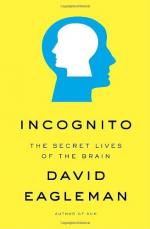
|
| Name: _________________________ | Period: ___________________ |
This test consists of 5 short answer questions, 10 short essay questions, and 1 (of 3) essay topics.
Short Answer Questions
1. How do sorters learn to do their job?
2. What is another type of brain cell?
3. What is the most important part of seeing?
4. What are our brains wired to do as far as complicated tasks are concerned?
5. What does an experiment that has people associate words such as "like" or "dislike" measure?
Short Essay Questions
1. What gap does Eagleman explore in Chapter 3?
2. What is one example Eagleman gives of how one reacts to something before the person is even aware of the situation?
3. What is seeing and what is the most important aspect of seeing?
4. What is the point of the experiment that Eagleman suggests the reader try?
5. What is the simple experiment Eagleman asks the reader to perform?
6. What does Eagleman say Sigmund Freud understood?
7. What happens to a blind person who recovers his/her sight?
8. What is another illustration of how one reacts to something before the person is even aware of the situation?
9. How does Eagleman offer an analogy of one's awareness to a newspaper headline?
10. Why is it an advantage to be able to do things without the use of the conscious mind?
Essay Topics
Write an essay for ONE of the following topics:
Essay Topic 1
This assembly of competing routines is what makes up most of the activity of our brains, and our conscious mind, as is demonstrated in brains where these competing processes have been interrupted or disconnected, is mostly at the mercy of our unconscious processes. Eagleman presents the results of experiments that suggest that our conscious mind will even fabricate reasons for our actions after the fact when we cannot tell what our true motivations are.
1. There is a saying that we do not really look at pros and cons for a decision but instead make the decision unconsciously and then justify our decision with pros and cons. Discuss this idea bringing in the examples Eagleman gives.
2. Do you think most of the time a person does not know his or her true motivations for behavior? Why or why not? Use examples from your own life and Incognito to support your reasoning.
3. Discuss an incident in your life where after it happen you could not understand why you said or did what you said or did. How does that incident relate to Eagleman's assertion about unconscious control of people's lives? Use examples from your own life and Incognito to support your reasoning.
Essay Topic 2
Eagleman presents the example of an experiment where men were shown photographs of the faces of several women and asked to rate their attractiveness. Photographs where the women's eyes had been dilated were consistently ranked as more attractive. When asked why they had chosen some women as more attractive than others, the subjects did not mention the dilated eyes as a factor, yet they clearly were. Eagleman adds that dilated pupils in a woman indicate a state of sexual arousal, suggesting that the subjects who found these photos more attractive were acting on a natural impulse of their unconscious minds.
1. Do you think attraction is a conscious choice or and unconscious one? Why or why not? Use examples from your own life and Incognito to support your answer.
2. Discuss one situation in which you were attracted to something, e.g. a person, a food dish, a car, etc. but were not sure why you felt the way you did and relate it to Eagleman's idea of unconscious attraction. Use examples from your own life and Incognito to support your answer.
3. If Eagleman is correct about why men might be attracted to a woman, what do you think that might mean about most marriages? Use examples from your own life and Incognito to support your answer.
Essay Topic 3
Another set of conflicting motivations in the human mind is the rivalry between short term and long term desires, Eagleman argues. He presents several examples of people acting in ways that serve a long-term interest and protect them from the their short-term tendencies. A Christmas club is one such example, where people put money aside each month and then have it returned at Christmas time for purchasing gifts. These kinds of self-bargains are called "Ulysses contracts" after the classical figure Ulysses who had himself lashed to the mast of his boat so he would not be persuaded by the beautiful song of the sirens to steer his boat into the rocks.
1. Why do you think it is important to learn how to delay gratification? Use examples from your own life and Incognito to support your reasoning.
2. What do you think might be the difference in delaying short term goals between a child of 10 and an adult? Use examples from your own life and Incognito to support your reasoning.
3. Discuss an example in your own life where you did or did not delay an immediate desire in order to achieve a long term goal. How did this incident relate to one of the examples Eagleman gave?
|
This section contains 1,352 words (approx. 5 pages at 300 words per page) |

|




